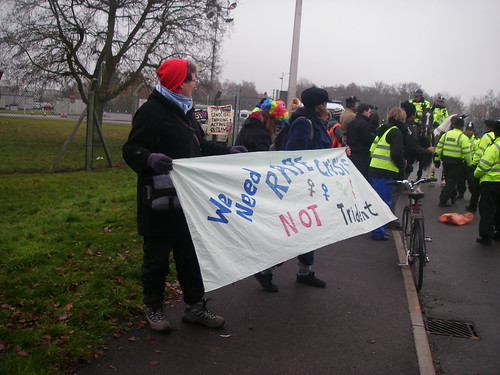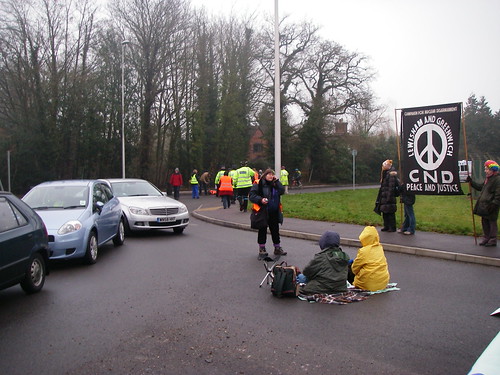International Blockade At AWE Aldermaston
The cat wouldn’t let me out of the house this morning. He coaxed me along for twenty minutes before I managed to distract him for long enough to grab an egg sandwich and slip through the door. Even so, by the time I got to AWE, it was still dark. This was the earliest I’ve got up in the UK since catching an early morning flight sometime last year.
The streets were quiet. When I reached the roundabout at Calleva Business Park, I realised that they were perhaps too quiet. The A340 ahead was blocked, blue lights flashing on top of a solitary police vehicle.
At first I thought I had come upon the scene of an accident. Somewhere, a bicycle tyre stuck up into the air. There was somebody lying on the tarmac.
Nobody stopped me, so I walked closer. Three people had spread themselves across the road, chained to steel pipes and a block of concrete. They were surrounded by police, but they would not move, could not move, even if they wanted to.
A light drizzle powdered the air and the temperature was close to freezing. Nailed to the Tarmac by the weight of their chains, the three protesters looked like human sacrifices: an offering to the war gods, if they let us have peace in return.
Snuggling guiltily into my warm coat, I walked on. There was a small group of women by the gate—out-numbered by police, as usual—but there was an equal number of parked cars, trapped by what turned out to be a blockade on both sides of the road. The drivers and passengers were unlucky, looking on as cyclists and pedestrians passed through unhindered. Other cars caught up on either side of the blockade simply turned around. For those not working at AWE it would mean a longer commute. I hoped that those who did work there would take the day off.
Soon I found myself on the traffic island in front of the gate. I wasn’t here to take part in the blockade and risk arrest, but it left me feeling cowardly. Back in the days of my youth, I’d have thrown myself right into the thick of it.
A woman holding a banner gestured for me to join her. As I took hold of the other end she said, “I’m not going to get arrested. I’m edging.”
‘Edging’, it turns out, is an important activity. We were holding up placards and banners to explain what the blockade is about and to draw attention to it. We talked to bystanders and the police and helped to keep the atmosphere jovial, with the blockaders gleefully joining in the singing and the music. Our presence provided support and reassurance. ‘Edging’ is an indispensable part of the protest.
Back in the days of my youth I failed to see past the action and through to the pragmatic side. Even though some of my neighbours and acquaintances surprised me with their new-found radicalism, there were many more who were sympathetic to the cause but feared arrest, and with good reason. Things are a lot more civilised in Britain, but that is in no small measure due to the rapport the protesters have established with the police.
“We’re not arguing with them,” a woman said, talking to a journalist. “We’re arguing with that“. She pointed to the barbed wire fence and wrinkled her nose in disgust.
There were not many women sitting on the Tarmac, but the courageous few proved to be well-prepared and effective. On both sides of the gate, and on both sides of the A340, women had chained each other to metal tubes. The police erected blue screens to deal with those who were blocking the road, carrying over tools and battery packs. It took them over two hours to cut the women lose. With their limbs still attached, they were led past the crowd one-by-one, to the applause and whooping of the bystanders.
All seven gates at Aldermaston, so I heard, were successfully blocked—for the first time in years. Each gate had attracted a particular group, with faith organisations, women’s peace groups, students and academics, internationalists, choirs and the Welsh and Scots each peopling their own gates
It was an international affair. I heard Spanish, Swedish and German spoken, read Danish and Dutch slogans and somebody on my left was dancing a Flamenco on the drum to which her friends had chained themselves, accompanied by clapping, singing and the rattle of peanut bottles. She and her friends held out for another hour before the police managed to cut their padlocks.
That was just the women’s gate. Nationalities present at the blockade overall included Brits, Spanish, Belgians, Dutch, French, Germans, US Americans, Irish, Swedes, Danes, Fins, Swiss, Japanese and probably others.
Sadly I missed the Scots’ cops tea party at the Boilerhouse Gate, the Welsh choir at the 340 Gate and the Zombie disco at Reading Gate. Next time I’ll bring a bicycle for a tour of the facilities.
Actually, that’s an idea… Bicycle demos used to be popular back in Germany.
Tags: AWE, Peace, Tadley Times, Tag Index





